April 20, 2012 -- Updated 1016 GMT (1816 HKT)
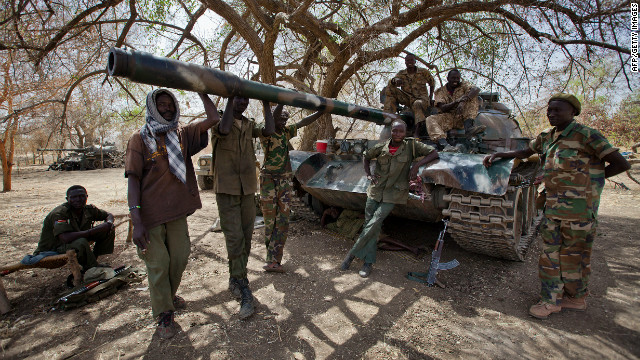
Sudan, South Sudan conflict worsening
STORY HIGHLIGHTS
- NEW: U.S. envoy says both sides want to avoid war despite rhetoric
- China and the U.N. call for an end to hostilities by both sides
- Clashes between the two nations soar in the past week
- Tensions intensified after South Sudan said it seized the disputed Heglig region
Clashes between the two
nations soared in the past week after South Sudan declared the disputed
Heglig region is under its control.
Sudan also claims
ownership and has lodged complaints with the United Nations and the
African Union, urging them to pressure South Sudan to withdraw troops
from its territory.
The United States on Thursday called for both sides to stop the hostilities.
"We condemn South Sudan's
military involvement in the attack on and seizure of Heglig, an act
which goes beyond self-defense and has increased tensions between Sudan
and South Sudan to dangerous levels," State Department spokeswoman
Victoria Nuland said. "We also condemn the continued aerial bombardment
in South Sudan by the Sudanese Armed Forces."
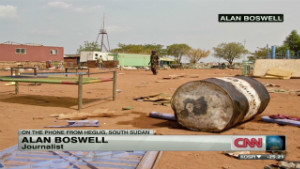
Oil dispute engulfs Sudan, S. Sudan
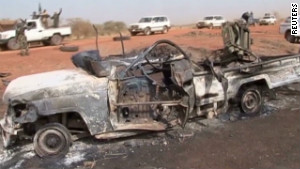
Airstrike escalates Sudan tensions
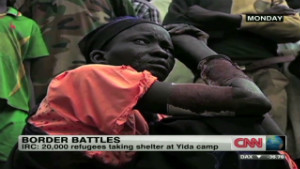
IRC: South Sudan conflict creates crisis
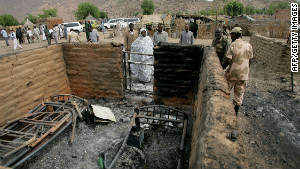
U.N. demands end to Sudan clashes
U.N. Secretary-General Ban Ki-moon urged both countries to return to the negotiating table.
"The last thing the
people of these two countries need is another war -- a war that could
claim countless lives, destroy hope and ruin the prospects of peace and
stability and prosperity of all Sudanese people," he said.
China, which has invested heavily Sudan's oil industry, also argued for calm.
"China again calls for
the two countries to immediately stop hostility and respect each other's
sovereignty," Liu Weiming, a spokesman for the Chinese Ministry of
Foreign Affairs, said at a regular news briefing Thursday.
During a rally broadcast
on state media, Sudanese President Omar al-Bashir said, "We will never
give up an inch of our land. And we have said it before, whoever extends
his hand toward Sudan, we will cut it off."
The international
community has urged Sudan and South Sudan to return to the table amid
intensified tensions. South Sudan split from its neighbor in July under
the terms of a 2005 peace agreement that ended decades of a civil war.
During the defiant
speech, the Sudanese leader told citizens that "Heglig is in Kordofan,"
referring to a border state owned by the nation.
"We will punish them ...
and it will be the last lesson for them," he said. "If they do not
understand, we will make them get it by force. We extended our hand
before for peace and unity. But they deceived us. Heglig is the start."
South Sudan did not
immediately respond to the latest speech, but a military official vowed
to retain a grip on the region a day earlier.
"We will hold this position," said Maj. Gen. Mangar Buong, a deputy commander for the South Sudanese military.
Princeton Lyman, the
U.S. Special Envoy for Sudan and South Sudan, has been in both countries
recently, holding meetings with government officials.
There is "an enormous
amount of very emotional, very powerful rhetoric coming from here in
Khartoum raising the stakes in many ways and that's worrisome in and of
itself," he said on a conference call from Khartoum on Thursday.
But he said that based
on the discussions he'd had in both Khartoum and Juba, "I can say with
confidence that virtually everyone I have talked to has said, 'Look, we
don't want to go to all out war with the other, we need to find a way
out.' "
Tensions run deep between the two nations, which have outstanding issues despite their divorce last year.
Unresolved issues
include status of citizens, how much the landlocked South should pay to
transport its oil through Sudan and the division of national debt, among
others. The fate of disputed border areas is also a point of
contention.
As long-simmering tensions soar, rights group are warning of deteriorating humanitarian conditions.
"The deteriorating
situation right now is making the overall humanitarian issues very
challenging," said Alex Neve, secretary-general of Amnesty International
Canada.
Neve, who is in the
South Sudan capital of Juba, said supply lines at refugee camps have
been cut off and failure to get key supplies before the rains will lead
to a humanitarian crisis.
In addition, there are reports of human rights violations.
"The refugees coming in
across the border have consistent stories of aerial bombardments and
ground attacks" from Sudanese soldiers, he said.
CNN's Amir Ahmed, David McKenzie, Faith Karimi and Jamie Crawford contributed to this report.


No comments:
Post a Comment